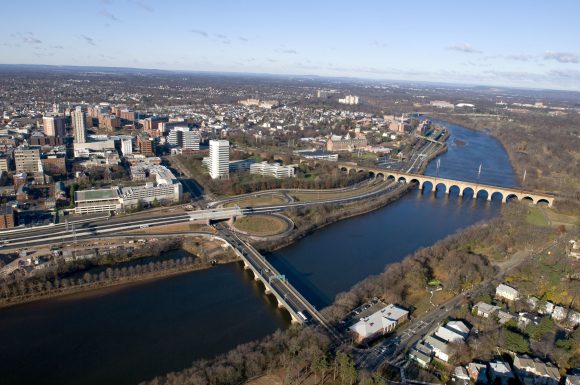
Raritan River, New Brunwick, Albany Street Bridge.
The Rutgers Raritan River Consortium has awarded five mini-grants to support research by Rutgers faculty, staff and post-doctoral researchers on Raritan River, basin and bay resource issues.; All five mini-grants involve partnerships with Raritan stakeholders; four of them were given to faculty in the School of Environmental and Biological Sciences. The five recipients and their projects are:
- Olaf Jensen, assistant professor (Department of Marine and Coastal Sciences), with NJDEP and New Jersey American Water Company, “Monitoring Fish Migration on the Raritan River: A Live Stream of Fish Ladder Passage”
- Josh Kohut, associate professor (Department of Marine & Coastal Sciences), and Robert Schuster (NJDEP Marine Water Monitoring Bureau), “2017 Raritan River Water Quality Sampling: Introducing Rutgers Students to NJDEP Sampling and Quality Control Standards”
- Max Häggblom, distinguished professor (Department of Biochemistry & Microbiology), and wastewater treatment plants discharging to the Raritan, “Anaerobic Biodegradability of Pharmaceuticals and Personal Care Products in Raritan River Sediments”
- Beth Ravit, assistant professor (Department of Environmental Sciences), and Keith Cooper, professor (Department of Biochemistry & Microbiology), with NY/NJ Baykeeper, “Microplastic Pollution in the Raritan River”
- Nicole Fahrenfeld, (Department of Civil & Environmental Engineering, ENG) and Kristi MacDonald, PhD (Raritan Headwaters), “Controls on the Fate and Ecotoxicity of Microplastics in the Raritan River”
Each mini-grant award was for $7,500 with the grant related work to be conducted between February 1 and August 31, 2017. More information about the recipients and their Raritan projects can be found at Rutgers Raritan River Consortium.
The Consortium, a program of Chancellor Richard Edward’s Strategic Plan Initiative, is a collaborative effort of Rutgers New Brunswick-Piscataway schools, programs, and departments that have joined together to advance Rutgers’ mission to be a better steward of the Raritan River and its environs. The Consortium has two primary goals: to utilize the Raritan River and its environs to inform university-based education, research and scholarship; and to apply Rutgers’ efforts, research and programs to collaborate with other Raritan partners to advance improvements in regional planning, policy and decision-making that positively affect the Raritan region and resources. By facilitating collaboration among Rutgers faculty, staff and students and engaging the greater Raritan community of businesses, municipalities, NGOs and other Raritan stakeholders, the Rutgers Raritan River Consortium will bring the university’s resources to bear to address concerns for the Raritan.
The Rutgers Raritan River Consortium is facilitated by Rutgers’ Sustainable Raritan River Initiative. Rutgers University launched the Sustainable Raritan River Initiative in 2009 to bring together concerned scientists, environmentalists, engineers, businesses, community leaders and governmental entities to craft an agenda that meets the goals of the U.S. Clean Water Act to restore and preserve New Jersey’s Raritan River, its tributaries and its bay. The Initiative, a joint program of the Edward J. Bloustein School of Planning and Public Policy and the School of Environmental and Biological Sciences, partners with other Rutgers schools, centers and programs to ensure the best contributions from the sciences, planning and policy.
To learn more about the Rutgers Raritan River Consortium, the mini-grants, or the Sustainable Raritan River Initiative, visit Rutgers Sustainable Raritan River Initiative.

